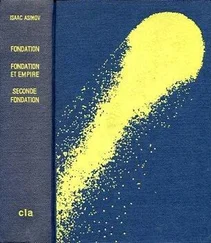There was an appalled pause, as realization seeped into the Student. He said: “Then the Seldon Plan has failed!”
“Not yet. It merely may have failed. The probabilities of success are still twenty-one point four percent, as of the last assessment.”
For Dr. Darell and Pelleas Anthor, the evenings passed in friendly intercourse; the days in pleasant unimportance. It might have been an ordinary visit. Dr. Darell introduced the young man as a cousin from across space, and interest was dulled by the cliché.
Somehow, however, among the small talk, a name might be mentioned. There would be an easy thoughtfulness. Dr. Darell might say, “No,” or he might say, “Yes.” A call on the open Communi-wave issued a casual invitation, “Want you to meet my cousin.”
And Arcadia’s preparations proceeded in their own manner. In fact, her actions might be considered the least straightforward of all.
For instance, she induced Olynthus Dam at school to donate to her a home-built, self-contained sound-receiver by methods which indicated a future for her that promised peril to all males with whom she might come into contact. To avoid details, she merely exhibited such an interest in Olynthus’ self-publicized hobby—he had a home workshop—combined with such a well-modulated transfer of this interest to Olynthus’ own pudgy features, that the unfortunate youth found himself: 1) discoursing at great and animated length upon the principles of the hyperwave motor; 2) becoming dizzyingly aware of the great, absorbed eyes that rested so lightly upon his; and 3) forcing into her willing hands his own greatest creation, the aforesaid sound-receiver.
Arcadia cultivated Olynthus in diminishing degree thereafter for just long enough to remove all suspicion that the sound-receiver had been the cause of the friendship. For months afterwards, Olynthus felt the memory of that short period in his life over and over again with the tendrils of his mind; until finally, for lack of further addition, he gave up and let it slip away.
When the seventh evening came, and five men sat in the Darell living room with food within and tobacco without, Arcadia’s desk upstairs was occupied by this quite unrecognizable home-product of Olynthus’ ingenuity.
Five men then. Dr. Darell, of course, with graying hair and meticulous clothing, looking somewhat older than his forty-two years. Pelleas Anthor, serious and quick-eyed at the moment, looking young and unsure of himself. And the three new men: Jole Turbor, visicastor, bulky and plump-lipped; Dr. Elvett Semic, professor-emeritus of physics at the University, scrawny and wrinkled, his clothes only half-filled; Homir Munn, librarian, lanky and terribly ill at ease.
Dr. Darell spoke easily, in a normal, matter-of-fact tone: “This gathering has been arranged, gentlemen, for a trifle more than merely social reasons. You may have guessed this. Since you have been deliberately chosen because of your backgrounds, you may also guess the danger involved. I won’t minimize it, but I will point out that we are all condemned men, in any case.
“You will notice that none of you have been invited with any attempt at secrecy. None of you have been asked to come here unseen. The windows are not adjusted to noninsight. No screen of any sort is about the room. We have only to attract the attention of the enemy to be ruined; and the best way to attract that attention is to assume a false and theatrical secrecy.”
( Hah, thought Arcadia, bending over the voices coming—a bit screechily—out of the little box.)
“Do you understand that?”
Elvett Semic twitched his lower lip and bared his teeth in the screwup, wrinkled gesture that preceded his every sentence. “Oh, get on with it. Tell us about the youngster.”
Dr. Darell said, “Pelleas Anthor is his name. He was a student of my old colleague, Kleise, who died last year. Kleise sent me Anthor’s brain-pattern to the fifth sublevel before he died, which pattern has been now checked against that of the man before you. You know, of course, that a brain-pattern cannot be duplicated that far, even by men of the Science of Psychology. If you don’t know that, you’ll have to take my word for it.”
Turbor said, purse-lipped, “We might as well make a beginning somewheres. We’ll take your word for it, especially since you’re the greatest electroneurologist in the Galaxy now that Kleise is dead. At least, that is the way I’ve described you in my visicast comment, and I even believe it myself. How old are you, Anthor?”
“Twenty-nine, Mr. Turbor.”
“Hm-m-m. And are you an electroneurologist, too? A great one?”
“Just a student of the science. But I work hard, and I’ve had the benefit of Kleise’s training.”
Munn broke in. He had a slight stammer at periods of tension. “I . . . I wish you’d g . . . get started. I think everyone’s t . . . talking too much.”
Dr. Darell lifted an eyebrow in Munn’s direction. “You’re right, Homir. Take over, Pelleas.”
“Not for a while,” said Pelleas Anthor, slowly, “because before we can get started—although I appreciate Mr. Munn’s sentiment—I must request brainwave data.”
Darell frowned. “What is this, Anthor? What brainwave data do you refer to?”
“The patterns of all of you. You have taken mine, Dr. Darell. I must take yours and those of the rest of you. And I must take the measurements myself.”
Turbor said, “There’s no reason for him to trust us, Darell. The young man is within his rights.”
“Thank you,” said Anthor. “If you’ll lead the way to your laboratory then, Dr. Darell, we’ll proceed. I took the liberty this morning of checking your apparatus.”
The science of electroencephalography was at once new and old. It was old in the sense that the knowledge of the microcurrents generated by nerve cells of living beings belonged to that immense category of human knowledge whose origin was completely lost. It was knowledge that stretched back as far as the earliest remnants of human history—
And yet it was new, too. The fact of the existence of microcurrents slumbered through the tens of thousands of years of Galactic Empire as one of those vivid and whimsical, but quite useless, items of human knowledge. Some had attempted to form classifications of waves into waking and sleeping, calm and excited, well and ill—but even the broadest conceptions had had their hordes of vitiating exceptions.
Others had tried to show the existence of brainwave groups, analogous to the well-known blood groups, and to show that external environment was not the defining factor. These were the race-minded people who claimed that humanity could be divided into subspecies. But such a philosophy could make no headway against the overwhelming ecumenical drive involved in the fact of Galactic Empire—one political unit covering twenty million stellar systems, involving all of Man from the central world of Trantor—now a gorgeous and impossible memory of the great past—to the loneliest asteroid on the periphery.
And then again, in a society given over, as that of the First Empire was, to the physical sciences and inanimate technology, there was a vague but mighty sociological push away from the study of the mind. It was less respectable because less immediately useful; and it was poorly financed since it was less profitable.
After the disintegration of the First Empire, there came the fragmentation of organized science, back, back—past even the fundamentals of nuclear power into the chemical power of coal and oil. The one exception to this, of course, was the First Foundation where the spark of science, revitalized and grown more intense, was maintained and fed to flame. Yet there, too, it was the physical that ruled, and the brain, except for surgery, was neglected ground.
Читать дальше
Конец ознакомительного отрывка
Купить книгу











